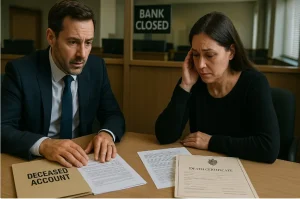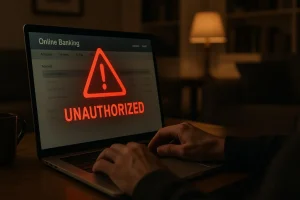
What is the Punishment for Taking Money From a Deceased Account UK?
Handling a deceased person’s finances in the UK comes with legal responsibilities and strict procedures.
One of the most common yet misunderstood issues is whether someone can access and use money from a deceased individual’s bank account.
Doing so without proper legal authority is not only unethical but also illegal.
This article explores what happens to a person’s bank account after they die, who has legal access, and most importantly, the punishments under UK law for unauthorised withdrawals.
Understanding the legal framework surrounding estate handling is crucial, especially when grieving families and close acquaintances are involved.
In this guide, we’ll examine the criminal and civil consequences, clarify lawful alternatives, and highlight the importance of following the probate process properly.
What Happens to a Bank Account When Someone Dies in the UK?

When a person passes away, any bank accounts held solely in their name are immediately subject to legal procedures and restrictions. The first action that must be taken is notifying the bank of the death.
Once informed, the bank will freeze the account to prevent any further withdrawals or deposits unless they are legally authorised.
This frozen status remains until someone obtains legal authority through probate or letters of administration.
While the account is frozen, all standing orders and direct debits are also stopped, although some banks may allow certain essential payments to go through if approved by the estate administrator.
Banks typically require the following before discussing the deceased’s financial affairs:
- A certified copy of the death certificate
- Proof of identification from the person notifying the bank
- A copy of the will (if available)
- Grant of Probate or Letters of Administration
Accounts that are jointly held are an exception. If the deceased shared a joint account with someone else, usually a spouse or civil partner, the funds in that account generally pass automatically to the surviving holder under the right of survivorship.
Who Has the Legal Right to Access a Deceased Person’s Account?
In the United Kingdom, accessing a deceased person’s bank account is not a right automatically granted to family members, spouses, or next of kin.
Only individuals who have obtained formal legal authority through the proper probate process are allowed to handle or distribute the funds in a deceased person’s account.
This legal framework exists to protect the deceased’s estate and ensure that all debts, taxes, and obligations are met before any distribution to beneficiaries.
1. Executor of the Will (When a Will Exists)
If the deceased left a valid will, the person or people named as executors are legally responsible for administering the estate.
Before they can access any funds in the deceased’s bank account, they must apply for and be granted probate a legal document issued by the Probate Registry.
Once probate is granted, the executor can:
- Access all bank and savings accounts
- Settle outstanding debts and liabilities
- Distribute remaining funds to named beneficiaries
- Close accounts on behalf of the estate
Executors are legally bound to act in the best interests of the estate and its beneficiaries. Misusing funds or failing to follow proper procedures can result in civil or criminal action.
2. Administrator of the Estate (When No Will Exists)
In cases where no valid will exists known as intestacy a close relative of the deceased (often a spouse, child, or parent) must apply for Letters of Administration.
Once approved, this individual becomes the administrator of the estate and gains similar legal authority to an executor.
Responsibilities of the administrator include:
- Identifying and valuing all estate assets
- Applying to HMCTS (Her Majesty’s Courts and Tribunals Service) for Letters of Administration
- Accessing the deceased’s bank accounts and financial records
- Paying off debts, taxes, and legal fees
- Distributing remaining assets according to the rules of intestacy
It’s important to note that administrators, like executors, cannot access funds before legal authority is granted, except in limited, bank-approved circumstances.
3. Joint Account Holders
If the deceased held a joint bank account with another person, such as a spouse or civil partner, the situation is usually more straightforward.
Under the right of survivorship, the entire balance of the joint account typically becomes the sole property of the surviving account holder.
However, there are caveats:
- The bank must be informed of the death immediately
- The account may still be reviewed as part of the estate if there are disputes or large sums involved
- In cases where the funds in the joint account were not considered jointly owned (e.g., only one person contributed), the balance might be partially included in the estate
Banks typically require a copy of the death certificate before transferring the joint account fully into the survivor’s name.
4. Access Without Probate: When Is It Allowed?
In certain limited circumstances, banks may allow access to funds without requiring a Grant of Probate or Letters of Administration. This is usually permitted when:
- The total balance in the deceased’s account is relatively small
- The funds are to be used only for specific purposes, such as:
- Paying funeral expenses
- Settling inheritance tax
- Covering probate application fees
Each financial institution has its own internal threshold for when probate is required. For example:
| Bank Name | Probate Threshold (Approximate) |
| Barclays | £50,000 |
| Lloyds Bank | £50,000 |
| NatWest | £25,000 |
| HSBC | £20,000 |
| Santander | £50,000 |
These thresholds are not set by law but by the banks themselves, and they can vary depending on the circumstances. Even when the amount falls below the threshold, banks typically require:
- A copy of the death certificate
- Proof of relationship to the deceased
- An indemnity form signed by the claimant
- Copies of invoices (for example, funeral bills)
It’s essential to check with each bank directly, as policies and limits change regularly.
5. Solicitors and Legal Representatives
Solicitors acting on behalf of executors or administrators can also gain access to the deceased’s accounts, but only after receiving proper authorisation.
This may involve submitting a certified copy of the probate or administration order and providing client verification under anti-money laundering regulations.
Solicitors often act as estate administrators in more complex cases, such as when:
- There are disputes among family members
- The estate is large or involves multiple properties and accounts
- The will is contested or unclear
They are legally obligated to act in the best interest of the estate and its beneficiaries, and they must keep detailed records of all financial transactions.
6. What Happens If Someone Accesses an Account Illegally?
If a person accesses a deceased individual’s bank account without proper legal authority, they may be committing fraud, theft, or unauthorised access to computer material.
Even if the intention was to use the funds for “helpful” purposes (like paying bills), doing so without probate or administration documents can lead to prosecution.
The bank may also report suspicious activity to the authorities, and the fun
Is It Illegal to Take Money From a Deceased Person’s Account Without Authorisation?

Accessing a deceased person’s bank account without proper legal authority is classified as theft or fraud.
Regardless of intention or relationship to the deceased, the unauthorised use of their funds is a criminal offence under UK law.
This includes:
- Withdrawing money using a debit card belonging to the deceased
- Logging into online banking and transferring funds
- Using cheques signed by the deceased
- Pretending to be the deceased in any financial transaction
- Misrepresenting oneself as an executor or administrator
These actions are covered under various laws, including the Theft Act 1968, Fraud Act 2006, and the Computer Misuse Act 1990.
In cases where online banking access is used without permission, the offence may also be considered unauthorised access to a computer system.
The severity of the crime is determined by the amount taken, the intention behind the action, and whether there was any attempt to cover up the unauthorised access.
What Are the Criminal Penalties for Taking Money From a Deceased Person’s Account in the UK?
The UK legal system takes financial misconduct surrounding estates seriously. Anyone found guilty of accessing and using a deceased person’s funds unlawfully may face a combination of criminal charges and civil penalties.
Key offences and their consequences:
- Theft: Removing money without right or permission.
- Fraud by false representation: Pretending to have authority over the account.
- Fraud by abuse of position: Taking advantage of a trusted role, such as an executor.
- Computer misuse: Accessing online accounts without legal right.
- Money laundering: Moving or hiding funds obtained illegally.
Table: Criminal Penalties for Estate Theft in the UK
| Offence | Legal Basis | Possible Sentence |
| Theft | Theft Act 1968 | Up to 7 years in prison |
| Fraud by false representation | Fraud Act 2006 | Up to 10 years in prison |
| Abuse of position | Fraud Act 2006 | Up to 10 years in prison |
| Unauthorised computer access | Computer Misuse Act 1990 | Up to 2 years in prison |
| Civil liability to estate | Common law | Reimbursement + damages |
| Minor or first-time offence | Summary judgement (Magistrates) | Fines up to £5,000 or community service |
The courts may also consider the return of funds, the remorse of the offender, and whether the breach was premeditated.
How Can Probate Fraud Be Reported and Investigated?
Probate fraud can be committed by a wide range of individuals, including family members, acquaintances, or even the executor of the estate.
The fraud may involve misrepresenting the terms of a will, falsifying documents, or illegally accessing bank accounts.
Steps to report and initiate investigation:
- Contact the deceased’s bank to report suspicious activity.
- Inform Action Fraud, the UK’s national fraud reporting centre.
- Report the issue to the police, especially where identity theft or large sums are involved.
- Seek assistance from a probate solicitor to initiate civil claims.
- Present evidence, including bank records, communications, and legal documents.
Investigations may involve freezing accounts, accessing banking records, and forensic accounting. If the individual accused of fraud is the executor or administrator, they may be removed by court order and replaced.
What Should You Do If You Suspect Someone Is Misusing a Deceased Estate?

If someone is misappropriating funds or property from a deceased estate, beneficiaries or other interested parties can challenge the misuse through both criminal and civil channels.
Typical indicators of misuse may include:
- Missing funds from estate accounts
- Undisclosed or hidden financial documents
- Secret withdrawals or account activity
- Refusal to share estate information
Legal actions that can be taken:
- Apply for a caveat to halt probate proceedings temporarily
- Seek an injunction to freeze assets or bank accounts
- Issue a citation requiring the suspected person to prove their authority
- File a civil claim against the individual to recover lost funds
In more serious situations, you may also report the misuse to the Office of the Public Guardian if it involves an attorney acting under a Lasting Power of Attorney (LPA) before the person’s death.
How Can You Legally Access Funds From a Deceased Person’s Account?
To legally access money from a deceased person’s bank account in the UK, you must follow the legal process for administering their estate.
This involves:
- Applying for Grant of Probate if the person left a will
- Applying for Letters of Administration if there is no will
- Submitting these documents to the bank along with identification and a certified copy of the death certificate
Some banks will allow a certain amount to be released without these documents, typically for:
- Funeral expenses
- Inheritance tax payments
- Probate fees
The thresholds vary significantly between banks. Some will release up to £5,000, others as much as £50,000, without probate. However, larger sums will always require formal authorisation.
How Can Families Protect a Deceased Loved One’s Finances From Fraud?

Protecting a deceased person’s estate requires both administrative diligence and timely legal action. Fraud often occurs when there are delays or gaps in the estate management process.
Preventative steps include:
- Notifying all financial institutions immediately upon death
- Securing debit and credit cards to prevent misuse
- Cancelling direct debits and standing orders that are no longer necessary
- Keeping clear and transparent records of any financial activity
- Involving a probate solicitor in complex estates
If the estate includes multiple assets, properties, or debts, professional legal support is often recommended. Transparency between family members can also reduce conflict and the risk of fraud or theft.
Conclusion
Taking money from a deceased person’s account in the UK without proper legal authorisation is a serious offence that can lead to theft or fraud charges, heavy fines, and imprisonment.
Whether intentional or not, unauthorised withdrawals breach both legal and ethical boundaries.
UK law provides a clear process for accessing a deceased person’s funds, including applying for probate or letters of administration.
Families and individuals must ensure they follow these legal pathways to protect the estate and avoid criminal consequences.
When in doubt, consult a solicitor or legal advisor who specialises in probate law to ensure compliance with all legal obligations.
FAQs
Is it a crime to use a deceased person’s debit card in the UK?
Yes, using a deceased person’s debit card is considered theft or fraud and is prosecutable under UK law.
How do I report someone taking money from a dead person’s account?
You can contact the police or report it to Action Fraud. Providing evidence helps initiate investigations faster.
Can a bank release money without probate in the UK?
Yes, in some cases, banks may release a limited amount without probate, depending on their internal policies.
What happens if a family member takes money from an estate?
They may face civil lawsuits, be required to return the money, and could also face criminal prosecution.
Is it legal to pay bills from a deceased person’s account?
Only if you are an authorised executor or administrator. Otherwise, it could be illegal.
What if there’s no will who can access the account?
An administrator, usually a close relative, must apply for Letters of Administration before accessing the estate.
Can joint account funds be used after death?
Yes, funds in joint accounts generally pass automatically to the surviving holder, unless the terms state otherwise.





